Duration: 09 Nights / 10 Days
Day 01: Arrive Delhi
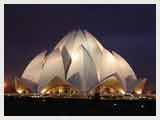
Arrive by International flight, after traditional 'Swagat' (Welcome) our representative would assist you at airport & transfer to hotel for check in.
Delhi is a bustling metropolis, which successfully combines in its folds the ancient with modern. Its strategic location was the prime reasons why successive dynasties chose it as their seat of power. In fact, more mythological cities are believed to be here, like the city of Indraprastha from the Hindu epic Mahabharata, founded around 5000 BC. Numerous monuments were built over several centuries by different rulers like Qutub-ud-din Aibek, Alauddin Khilji, Tughlaks, Humayun & Shah Jahan, who built the Walled City Shah Jahanabad.
Later in first half of 20th century much of New Delhi was planned by Sir Edwin Lutyens, who laid out a grandiose central administrative area as a testament to British rule in India. The division in walled city & New Delhi also marks the division in life styles.
Overnight Hotel – Delhi (B)
Day 02: Delhi
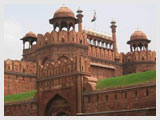
Today we take a guided tour of Old Delhi, the 17th century walled city of Shah Jahanabad, Visiting the great Jama Masjid, the principal mosque of Old Delhi. Built in the year 1656 AD by the Mughal Emperor Shah Jahan, it is the largest & best known mosque in India. Later we walk down or take a rickshaw ride through Chandi Chowk, the old marketplace of Shah Jahanabad now a picturesque bazaar to reach Red Fort, built in the year 1648 by Shah Jehan.
In New Delhi, we visit Raj Ghat, memorial to the Father of the Nation, Mahatma Gandhi. It is a simple black marble platform that marks the spot of his cremation on 31 January 1948. Further we drive past India Gate, memorial built in the year 1931 to commemorate the Indian soldiers who died in the World War I & the Afghan Wars. The names of the soldiers who died in these wars are inscribed on the walls. President's House, the official residence of the President of India, built in the year 1931. Until 1950 it was known as Viceroy's House & served as the residence of the Governor-General of British India.
We will also visit Humayun's Tomb, memorial of Mughal Emperor Humayun, built in the year 1562. The complex is a World Heritage Site & the first example of this type of Mughal architecture in India. Qutub Minar, built in the year 1206 by Qutub-ud-din Aibek. It is the tallest (72m) brick minaret in the world, an important example of Indo-Islamic Architecture. Qutub Minar & its monuments are listed as a UNESCO World Heritage Site.
Overnight Hotel – Delhi (B)
Day 03: Delhi - Haridwar - Rishikesh (220 km - 5 hr)
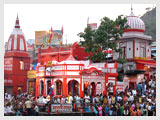
Today we drive to Rishikesh enroute visiting Haridwar, on the banks of river Ganga (Ganges), located at the foothills of the lower Himalayan Range of the Shivalik Mountains. Haridwar lliterally meaning Gateway to God, one of the most sacred pilgrimage sites for Hindus.
Upon arrival check in at hotel.
Rishikesh, Located in the laps of lower Himalayas, & is surrounded by scenic beauty of the hills on three sides with Holy Ganga flowing through it. It is claimed as Yoga Capital of the World. Rishikesh is also the gateway & the start-off point for journeys to important religious places like Badrinath, Kedarnath, Gangotri & Yamunotri.
Evening witness the Aarti ceremony at river Ganges.
Overnight Hotel - Rishikesh. (B)
Day 04: Rishikesh

Morning Yoga Session at hotel.
Later we visit Laxman Jhula, suspension Iron Bridge Lakshman Jhula was built in 1929. This is where Rama's brother Lakshman is said to have crossed the river on jute ropes. One can enjoy the spectacular surroundings & the cool breeze from the River while standing on the bridge. Ram Jhula, another suspended bridge close to Lakshman Jhula is the Ram Jhula- This suspended bridge was recently built between Shivanand & Sawarg Ashram. It is similar to the Lakshman Jhula. It is also known as Shivanand Jhula.
Later we visit Geeta Bhavan, famous for its attractive paintings and statues from the Hindu mythology. Situated just across the Lakshman Jhula
Overnight Hotel – Risikesh (B)
Day 05: Rishikesh – Delhi (220 kMs. / 05 hours)
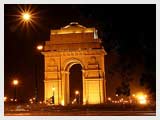
Today morning drive back to Delhi. Upon arrival check-in to the hotel.
Overnight Hotel – Delhi (B)
Day 06: Delhi - Jaipur (260 kms - 6 hrs)
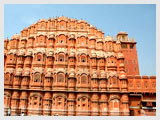
Today we drive to Jaipur, popularly known as Pink City, the flamboyant & colourful capital of Rajasthan. With its rich & colourful past, resplendent with tales of valour & bravery, it is now one of the most important heritage cities in India. The city was founded in 1728 by Maharaja Sawai Jai Singh II, the ruler of Amber. It remains the only city in the world symbolizing the nine divisions of the universe, through nine rectangular sectors.
Optional Tour - Chokhi Dhani
An evening excursion to Chokhi Dhani complex, ethnic village resort located at a distance of 15 km from Jaipur. Rajasthani village atmosphere is recreated on the sprawling ground & includes the entertainment by folk dancers & musicians. Later drive back to hotel.
Overnight Hotel - Jaipur (B)
Day 07: Jaipur
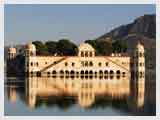
Today we take an excursion to Amber Fort (11 km); the palace complex which stands to this date was commenced under the reign of Raja Man Singh. We take an Elephant ride to reach the Fort situated on the hill, an overwhelming experience.
Half Day Tour
Later we visit the City Palace, a perfect blend of Rajasthani & Mughal architecture. The center of the palace is a seven-storied building called Chandra Palace, with fine views over the gardens & the city. Further we visit Jantar Mantar, the Solar Observatory, an astronomical treasure house, with solar devices that give accurate predictions till date. We now visit Hawa Mahal (Palace of Winds), a five-storied structure of pink sandstone. It was built in year 1799 so that veiled royal women could peer down unseen by the world through its 593 stone Jharokas (mini windows).
Overnight Hotel – Jaipur (B)
Day 08: Jaipur – Agra via Fatehpur Sikri (260 km - 6 hr)
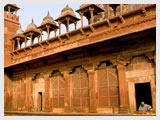
Today we drive to Agra, en route we will visit Fatehpur Sikri (Ghost Capital), the political capital of India's Mughal Empire under Akbar's reign, from 1571 until 1585, when it was abandoned, ostensibly due to lack of water.
Further we continue our drive to Agra, beautifully situated on the banks of river Yamuna. It achieved prominence as the capital of the Mughal Emperors from 1526 to 1628, remains major tourist destination because of its many splendid Mughal-era monuments, most notably the Taj Mahal, Agra Fort & Fatehpur Sikri, all three of which are UNESCO World Heritage site.
Overnight Hotel – Agra (B)
Day 09: Agra - Delhi Via Mathura (220 km - 5 hr)

Today we visit Taj Mahal,(Closed on Friday) symbol of eternal love, which stands on the banks of River Yamuna. It was built by the 5th Mughal emperor, Shah Jehan in the year 1631 in memory of his wife, Mumtaz Mahal. It was completed in 22 years. Further we visit Agra Fort, taken over from the Lodhis by the Mughal Emperor Akbar in the late 16th century. The Fort can be more accurately described as a walled palatial city. It was built from red sandstone, often inlaid with white marble & intricate decorations. We will also visit Sikandara, Akbar's tomb. His son Jahangir completed the construction of the tomb in the year 1613.
Later drive to Delhi via Mathura Vrindavan
Mathura, the history and culture of this holy town revolves around the legends of Lord Krishna. It's very colourful and Jubilent celebration of festivals like Holi, Teej & Janmashtmi. Visit Dwarkadeesh Temple,Kans Quila, Sri Krishna Bhumi.
(12 kms by Road) Then Proceed to Vrindavan, this town is woven with tales & folklore of Lord Krishna's pranks as a child and with tales of Queen Mira Baiwho sacrificed all worldly gains in her devotion to Lord Krishna. Visit Govinddev Temple, Rangaji Temple, Gopinath Temple, Radha Ballabh Temple are just few of them.
Later in time drive to Delhi and transfer to hotel for check in.
Overnight Hotel – Delhi (B)
Day 10: Delhi – Departure (by Flight ) )
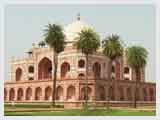
Todaon time transfer to Delhi airport to board the flight to onward journey.
Our tour concludes: Caper thanks you for your patronage & look forward serve you again in near future.
Ask our Travel Experts!